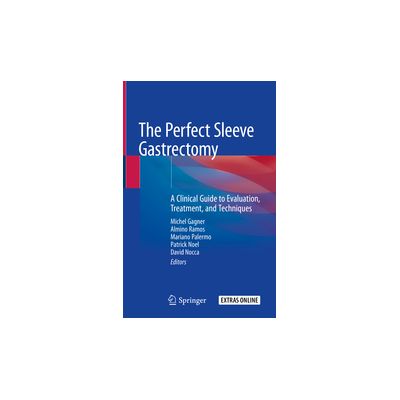The Perfect Sleeve Gastrectomy A Clinical Guide to Evaluation, Treatment, and Techniques

DESCRIERE
Sleeve gastrectomy (SG) is the most common bariatric procedure performed worldwide, more than 55% of bariatric procedures are sleeve gastrectomies. This title will be comprehensive and detail all the approaches used in performing sleeve gastrectomy, offering readers all the tools needed to perform the perfect SG.
Obesity has become a major global problem that continues to spread in both developed and developing countries. It costs more than any other health problem due to its prevalence and its many costly complications such diabetes and heart disease as well as in disability and loss of productivity. While prevention of obesity is the best approach for the future, the current problem lies with managing those who are already obese or morbidly obese who constitute close to two thirds of the population in many countries such as the US. Diet, exercise, and behavioral change are the mainstays for any meaningful attempt for significant and durable weight loss. Unfortunately, for those who are morbidly obese, these measures alone almost consistently fail to achieve acceptable weight loss in the long term.
Today, bariatric surgery is the only evidence-based treatment for morbid obesity with a low complication rate and acceptable results in the long-term for both weight loss and resolution of comorbidities.
Despite the data, the acceptance of these operations was limited due to fear of what was perceived as major surgery. Today, applying minimally invasive technology to these complex operations made them more acceptable to patients due to decreased pain, faster recovery and fewer overall complications. This, in addition to improved outcomes as we went further along the learning curve, has made these operations more common and helped growing the field to be an independent specialty for surgeons and perhaps a new specialty for gastroenterologist.
In these exciting times, the 5 international editors (one of them, Michel Gagner, is the creator of the SG) wanted to capture the global standards of practice at a time of change, excitement, and lots of controversy, regarding this common procedure.
We an aim to shed light on best practices across the borders, the intention of this volume is to develop a reliable reference to guide the practicing physician anywhere in the world, and from whatever specialty (surgeon, gastroenterologist or endoscopist) to navigate through the many current options of therapy in this rapidly changing field.
We also aim to provide high quality illustrations and high-definition videos of these techniques to go with the didactic chapters written by thought leaders. In this book we will focus first on the clinical problems of the patients and the indications for the sleeve. Regarding the technical aspects, we will describe the technique step-by-step (including videos) and also we will detail the staplers, its size and different colors -- and the different sizes of the bougies, and also special description of the reinforcement of the sutures after the sleeve. We know that mainly the SG has a restrictive function, but we will also describe the metabolic effects of this surgery.
Then we will describe the nontraditional SG techniques, such as the endoscopic approach, staples sleeve and robotic technologies. Bariatric surgery has very few rates of complications, but when complications happen, they are severe. Thus we will describe how to identify them immediately and also the different approaches to treat them by endoscopy, laparoscopy and percutaneous image guided surgery.
A chapter will also cover revisional surgery and the different revisional procedures, not only from sleeve to other procedures but also from other procedures to SG.
For the last section, we will include the lessons learned from almost 20 years now since the SG was first described, providing an overview on how we imagine the future will be for the most common bariatric procedure performed worldwide.
This title will be an ideal reference for general surgeons, bariatric surgeons, endoscopists and gastroenterologists with interest in obesity management as well as researchers with interest in obesity. Residents and fellows training in general and bariatric surgery as well as in endoscopy. Dietitians, diabetes specialist, psychotherapists with interest in obesity management as well as hospital administrators and quality officers in hospitals with bariatric practices will also benefit by this book.
Categorii de carte
-Comandă specială
-Edituri
-Promo
-Publicaţii Callisto
-Cărţi noi
-- 992,25 leiPRP: 1102,50 lei
- 604,80 leiPRP: 672,00 lei
- 595,35 leiPRP: 661,50 lei
Promoţii
-- 992,25 leiPRP: 1102,50 lei
- 604,80 leiPRP: 672,00 lei
- 595,35 leiPRP: 661,50 lei












REVIEW-URI